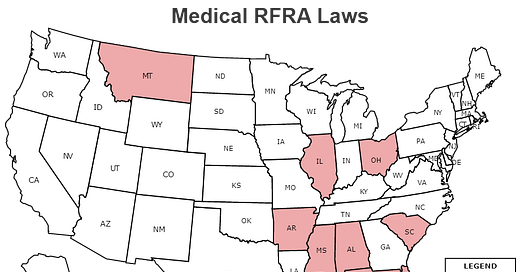Travel Guide: Medical RFRA
A huge concern for trans* folks travelling domestically is whether they will be able to access emergency medical care. The cause of the uncertainty is state-level medical “Religious Freedom Restoration Act” (RFRA) laws, which generally permit medical practitioners from ‘participating’ in a health care service that violates their conscience.
The existing state-level laws all provide a technical exception for the kind of stabilizing emergency medical care which is required under 42 U.S.C. § 1395dd. In today’s political climate, however, it is not a stretch to imagine a situation where a nurse, doctor, or other medical professional might refuse care to a transgender person, even in an emergency (or near-emergency) situation.
Note: A federal RFRA was enacted in 1993, but it is outside of the scope of this page/post. You can find a solid primer on it here.
Alabama, Arkansas, Florida, Illinois, Mississippi, Montana, Ohio, and South Carolina each have RFRA laws specifically directed at medical professionals, sometimes specifically focused on the provision of gender affirming care. Some laws are more dangerous than others, read through for details.
Alabama
A health care provider has the right not to participate, and no health care provider shall be required to participate, in a health care service that violates his or her conscience (§ 22-21B-4(a)).
Arkansas
A medical practitioner, healthcare institution, or healthcare payer:
(1) Has the right not to participate in a healthcare service that violates his, her, or its conscience;
(2) Is not required to participate in a healthcare service that violates his, her, or its conscience (§ 17-80-504(a)).
Florida
A health care provider or health care payor has the right to opt out of participation in or payment for any health care service on the basis of a conscience-based objection. (§ 381.00321(2)(a)).
Illinois
No physician or health care personnel shall be civilly or criminally liable to any person, estate, public or private entity or public official by reason of his or her refusal to perform, assist, counsel, suggest, recommend, refer or participate in any way in any particular form of health care service which is contrary to the conscience of such physician or health care personnel. (745 ILCS 70/4).
Mississippi
The state government shall not take any discriminatory action against a person wholly or partially on the basis that the person declines to participate in the provision of treatments, counseling, or surgeries related to sex reassignment or gender identity transitioning or declines to participate in the provision of psychological, counseling, or fertility services based upon a sincerely held religious belief or moral conviction described in Section 11-62-3. This subsection (4) shall not be construed to allow any person to deny visitation, recognition of a designated representative for health care decision-making, or emergency medical treatment necessary to cure an illness or injury as required by law. (§ 11-62-5(4))
Montana
A health care institution or health care payer may not be required to participate in or pay for a health care service that violates the health care institution's or health care payer's conscience, including by permitting the use of its facilities. (§ 50-4-1102(1)(a)).
Ohio
Notwithstanding any conflicting provision of the Revised Code, a medical practitioner, health care institution, or health care payer has the freedom to decline to perform, participate in, or pay for any health care service which violates the practitioner's, institution's, or payer's conscience as informed by the moral, ethical, or religious beliefs or principles held by the practitioner, institution, or payer. (§ 4743.10(B)).
South Carolina
A medical practitioner, health care institutions, and health care payers have the right not to participate in or pay for any health care service which violates the practitioner's or entity's conscience. (§ 44-139-30(A)).



